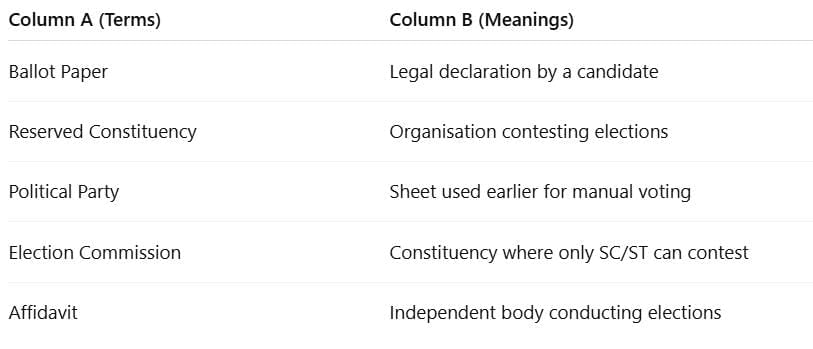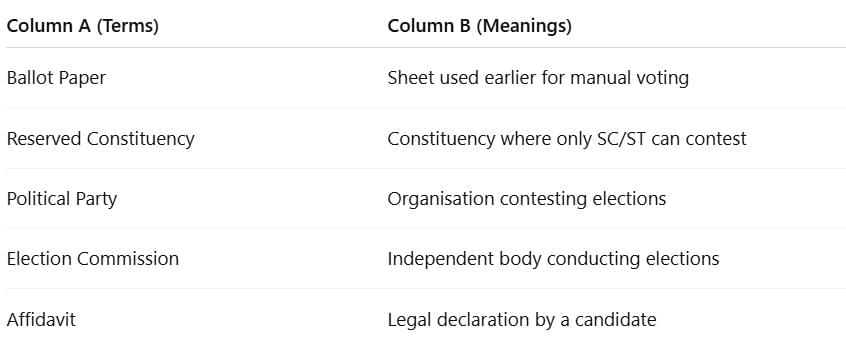Worksheet Solution: Electoral Politics Class 9 Worksheet Civics Chapter 1
| Table of contents |

|
| Multiple Choice Questions (MCQ) |

|
| Fill in the Blanks |

|
| Match the Following |

|
| Very Short Answer Questions |

|
Multiple Choice Questions (MCQ)
Q1: Who appoints the Chief Election Commissioner of India?
(a) The Chief Justice of India
(b) The Prime Minister of India
(c) The President of India
(d) The Law Minister of India
Ans: (c) The President of India
According to the Indian Constitution, the President appoints the Chief Election Commissioner. However, after appointment, the CEC functions independently and is not answerable to the President or the government.
Q2: Constituencies called ‘wards’ are made for the election to
(a) Parliament
(b) State Legislative Assembly
(c) State Legislative Council
(d) Local bodies such as Panchayats and Municipalities
Ans: (d) Local bodies such as Panchayats and Municipalities
Wards are smaller divisions used for elections in local government bodies like municipal corporations and Panchayati Raj institutions.
Q3: Which of these is not a part of the district and local level bodies?
(a) Panchayats
(b) Municipalities
(c) Corporations
(d) Lok Sabha
Ans: (d) Lok Sabha
Lok Sabha is a part of the Union Parliament and not related to local or district-level governance, which includes Panchayats, Municipalities, and Corporations.
Q4: When on election duty, under whose control do the government officers work?
(a) Central Government
(b) Election Commission
(c) District Magistrate
(d) District Court
Ans: (b) Election Commission
During elections, all officers and staff involved in election duties are under the direct control of the Election Commission, not the government.
Q5: Which document must a candidate submit before elections?
(a) Identity Card
(b) Nomination Form
(c) Proof of citizenship only
(d) School certificate
Ans: (b) Nomination Form
To contest elections, candidates must file a nomination form along with a security deposit and affidavit disclosing criminal records (if any), assets, liabilities, and educational qualifications.
Fill in the Blanks
Q1: In India, Lok Sabha and Vidhan Sabha elections are held regularly after every _______ .
Ans: In India, Lok Sabha and Vidhan Sabha elections are held regularly after every five years.
Q2: The party that does not form the government is called the _______.
Ans: The party that does not form the government is called the opposition.
Q3: The list of those people who are eligible to vote is officially called the Electoral Roll and is commonly known as the _______ .
Ans: The list of those people who are eligible to vote is officially called the Electoral Roll and is commonly known as the Voters List.
Q4: _______ is the term used for fake voting or misuse of polling process.
Ans: Rigging is the term used for fake voting or misuse of the polling process.
Q5: A person must be at least _______ years old to vote in India.
Ans: A person must be at least 18 years old to vote in India.
Match the Following
 Ans:
Ans: 
Very Short Answer Questions
Q1. Who formed the new party named Lok Dal?
Ans: Choudhary Devi Lal.
Q2. How many Lok Sabha Constituencies are there in the Indian Parliament?
Ans: 543 seats.
Q3. What is an Electoral Roll?
Ans: It is the list that contains the particulars of eligible voters.
Q4. What is a party ticket?
Ans: A party ticket is the official nomination by a political party, allowing a candidate to contest elections with the party’s symbol and support.
Q5. What do you mean by Turn Out?
Ans: Turnout refers to the percentage of eligible voters who actually cast their vote.
|
55 videos|635 docs|79 tests
|
FAQs on Worksheet Solution: Electoral Politics Class 9 Worksheet Civics Chapter 1
| 1. What is electoral politics? |  |
| 2. Why is electoral politics important? |  |
| 3. How does the electoral politics system work in a democracy? |  |
| 4. What role do political parties play in electoral politics? |  |
| 5. How can citizens participate in electoral politics? |  |




















